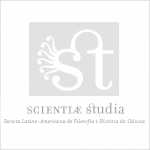Aspectos históricos do ensino superior de química
Vol. 2, No. 1 • Scientiae Studia
Autor: Juergen Heinrich Maar
Resumo:
O presente trabalho pretende, sem ser exaustivo, apresentar aspectos históricos essenciais relacionados com a formação do químico em nível superior, "os pequenos fatos significativos", como dizia Taine, e apresentar as características dos diferentes períodos da evolução da química como atividade acadêmica, ou como disciplina universitária, bem como os fatores decisivos para as mudanças estruturais e institucionais observadas. Não entraremos por ora no mérito de currículos, práticas, textos ou programas. Uma história que sem querer ser rankeana, do wie es wirklich gewesen ist, ("como realmente aconteceu") procura relacionar dados antes de discutir com maior profundidade os conteúdos, métodos e resultados do ensino superior de química em cada um dos períodos abordados, o que ficará para trabalhos posteriores, mas que procura inserir a química no contexto universitário como um todo. Cronologicamente, limitar-nos-emos ao período que vai da universidade medieval e da alquimia às primeiras décadas do século XIX, isto é, até a consolidação da química como disciplina universitária. Depois de uma discussão sobre a relação informal entre a alquimia e a universidade medieval, abordaremos a química (quimiatria) associada à medicina e à farmácia (séculos XVI e XVII), a química mais "aplicada" associada à metalurgia e à indústria (século XVIII), uma química independente alocada na faculdade não de medicina mas de filosofia (pela primeira vez em 1789). Na transição do século XVIII ao xix consolida-se a química como disciplina universitária.
Abstract:
This paper intends, without the pretention of being exhaustive, to present essential historical aspects related to higher chemical education, "the significative unrelevant facts" mentioned by Taine, discussing the characteristical aspects of the various evolutive periods which can be considered in chemistry as an academical activity, or as an university discipline, discussing as well decisive factors for the structural and institutional changes observed. We will not at this point argue about the essential issues related to curricula, practices, texts or programs. A history which, not limited to the rankean wie es wirklich gewesen ist , looks for collecting the necessary data before a deeper discussion of contents, methods and results of higher chemical education in each one of the periods considered could take place, leaving a more profound discussion for future papers. But we do insert chemistry in the university context as a whole. From a chronological viewpoint, we will comment the period extending from medieval university to the beginnings of the 19th century, just to the consolidation of chemistry as an university discipline: after comments on the unformal relations between alchemy and medieval university, we will comment chemistry/chemiatry related to medicine and pharmacy (16th and 17th centuries), a more "applied" chemistry in connection with metallurgy and other industries/"arts" (18th century), and an independent chemistry located not at the medical but at the philosophical faculty, for the first time in 1789. At the eve of the 19th century, chemistry establishes itself as an autonomous activity at universities and institutions of higher learning.
DOI: http://dx.doi.org/10.1590/S1678-31662004000100003
Texto Completo: http://www.scielo.br/scielo.php?script=sci_arttext&pid=S1678-31662004000100003&lng=pt&nrm=iso&tlng=pt
Palavras-Chave: History of scientific institutions,History of

Scientiae Studia
Associação Filosófica Scientiae Studia - Revista Scientiae Studia
